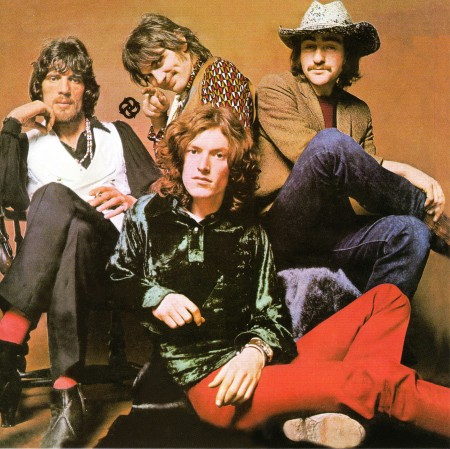
Traffic: Liner Notes
(2001 US CD Reissue Essay by Brian Hogg):
In January 1968 the original Traffic line-up: Stevie Winwood (vocals/guitar/organ), Dave Mason (vocals/guitar), Chris Wood (saxophone/flute) and Jim Capaldi (drums/vocals) had, by January 1968, been reduced to a trio by the departure of Mason. Undaunted, the band took to the road and in doing so discovered an extraordinary bond. Naturally the spotlight fell on Winwood who filled the sound with pedal bass lines, organ and soaring voice, but Capaldi's measured, rhythmic punch and Wood's intuitive woodwind breathed colour into the sound. (A flavour of Traffic as a trio is preserved on two live tracks issued on the 1969 album 'Last Exit').
Dave Mason meanwhile, was equally productive. He produced the first Family album, 'Music In A Doll's House', which featured one of his songs, 'Never Like This', and the same group accompanied him on a solo single, 'Little Woman' (February 1969). By May he was back in the Traffic fold, having returned from Greece "mellow", (to quote Capaldi), and armed with a batch of new songs. Inspired, the foursome began recording their eponymous second album. 'Traffic' captures the group at their communal best. Mason's contributions, 'Don't Be Sad', the folk-styled 'You Can All Join In' and 'Feelin' Alright', are firmly part of the canon, the last-named achieving anthemic proportions when covered by Joe Cocker. Indeed every song is a triumph; from the fiery punch of 'Pearly Queen' to the meditative longing of 'No Time To Live' and 'Crying To Be Heard'. 'Who Knows What Tomorrow May Bring' is, perhaps, the highlight, but who needs comparisons in a bowl of diamonds? 'Traffic' captures a spirit of adventure and those early weeks in Berkshire spill from every track.
Paradoxically, it was Mason's work which was used to promote the album. 'You Can All Join In' was issued as a single in Europe and became the title track to a celebrated sampler in Britain. With this in mind, 'Feelin' Alright' was lifted as the UK 45, with both versions backed by the searing 'Withering Tree', on which Winwood allowed his expressive voice to flow fully. It may indeed have proved biographical, as by October Mason again had quit the band. "We became Traffic and I couldn't handle it," he explained in later years. "I wanted to create within that context but I wanted a life out of it." "Dave and I see things differently," was Winwood's enigmatic response. That brief optimism over, Traffic reverted to a trio, capping a successful US tour with an open air gig in San Francisco, jamming with the Grateful Dead. Yet the strain of being sole frontman began to tell on Winwood and at the end of 1968 he told Island Records' Chris Blackwell he was leaving the group and split for Holland.
[UK Addition: A 'final' single, 'Medicated Goo' c/w 'Shanghai Noodle Factory', was duly exhumed. The topside, on which Stevie plays almost all the instruments, is an unfettered joy, while the more measured coupling captures the band in semi-funk mode. Both of these tracks, plus 'Withenng Tree', have been added here, along with the first two tracks Traffic recorded in 1967. Both were cut for the 'coming of age' film, 'Here We Go 'Round The Mulberry Bush'. The title track needs little introduction but the other, 'Am I What I Was Or Was I What I Am' has previously only been available on the soundtrack album. Strangely, it's not a million miles musically from Stevie's work with the later Spencer Davis Group, the revived line-up of which also contribute to the movie.]
With Winwood considering his future, Chris and Jim rejoined Dave and keyboard player Mick Weaver (aka Wynder K Frog) in Mason, Capaldi Wood and Frog. They too retired to a cottage, this time in Worcestershire, the unit collapsed after two months, leaving behind a handful of gigs and a John Peel radio session. Mason then left for the USA where he cut the excellent 'Alone Together'.
When Winwood returned from Holland he was approached by ex-Cream guitarist Eric Clapton to consider a musical joint venture. [They had briefly worked together in the Powerhouse in 1966, but Stevie opted to stay with Spencer Davis rather than join Cream.]
After some "exploratory" writing sessions, the two musicians were joined by fellow ex-Cream member, drummer Ginger Baker, and later, Family bassist Rick Grech, the resulting band being christened Blind Faith. Blind Faith recorded one album, the critically acclaimed and bestselling Blind Faith, and after months of touring disbanded in September 1969.
The following year Stevie joined Ginger Baker's Airforce, a huge and ultimately unworkable big band which coincidentally included Chris Wood. However, Winwood was never a full-time conscript and in the spring of 1970 with the assistance of producer Guy Stevens, began work on a solo project tentatively titled 'Mad Shadows', and ultimately evolving into the classic Traffic album 'John Barleycorn Must Die'.
These original analogue masters have been digitally transfered at 24 bits resolution, processed using Sonic Solutions NoNoise technology and mastered to 16 bit for CD using Prism SNS Noise Shaping.